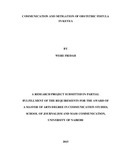| dc.description.abstract | The main goal of this project was to establish the effectiveness of health communication in mitigating Obstetric Fistula(OF) among women in Kenya.This research concentrated on how communication can be used to improve ways of addressing OF in Kenya. The study was conducted in Matungu division of Matungu district, Kakamega County with the help of Matungu district Hospital staff: doctors, nurses and care givers, elders and members of the community, pregnant women, victims of OF and their famiies. The study relied mainly on primary data sources to collect information gathered through IDIs and FGDS using semi-structured interview guides.Stratified sampling technique was used to come up with sample respondents. The study also employed qualitative research methods to explore the perspectives of the respondents on their experiences and beliefs about the impact of Communication OF. This data was coded and entered into Statistical Packages for Social Scientists (SPSS Version17.0) and analyzed using descriptive statistics. The findings demonstrated that maternal health is very fundamental and must be considered to effectively address OF. Others factors that need to be considered when addressing OF include culture – both religious and traditional, socio-economic status, access to information and health care facilities, political good will and relevant infrastructure: transport and communication. The study also established that there was insufficient information about OF among the respondents and that there was need for improved access to information and education on OF and the related surrounding issues. The study also revealed that Mass Media and Group Communication were the most preferred channels of communication for IEC materials and activities. The study concluded that Communication can be effective in mitigating OF among the women and girls in Kenya. It is however very crucial to educate and fully inform members of the public about OF to increase individual learning and empowerment, capacity building, critical consciousness and support. Health service providers should also be trained to properly handle cases of OF and to inform pregnant women during ANC visits to avert OF. The Government and other development partners should also organize media campaigns and group communication to sensitize educate and sensitize the public about OF. | en_US |

